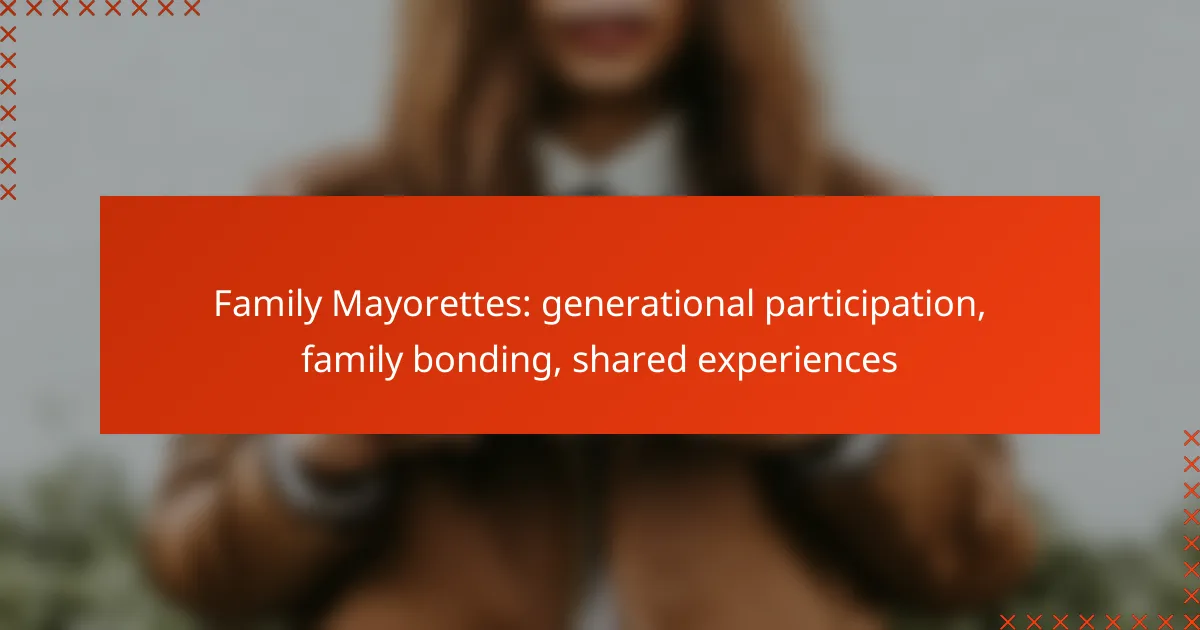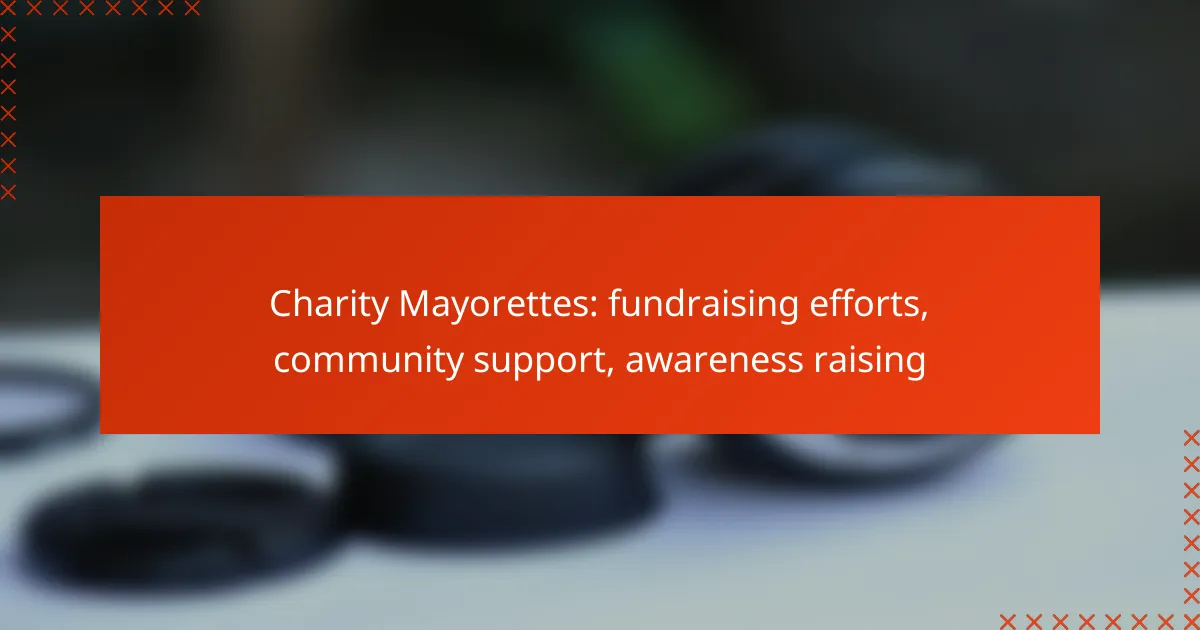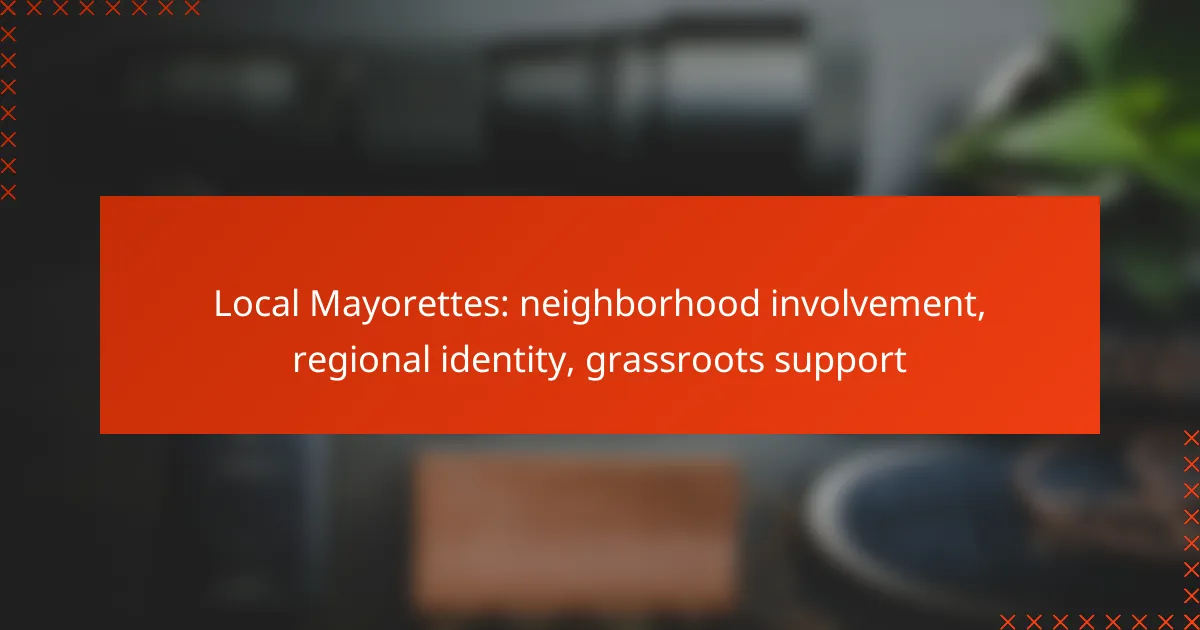Family mayorettes in Canada serve as a unique platform for fostering generational participation and strengthening family bonds through shared community activities. By engaging in traditions and events together, families create lasting memories and develop teamwork skills, enhancing their sense of unity and belonging.
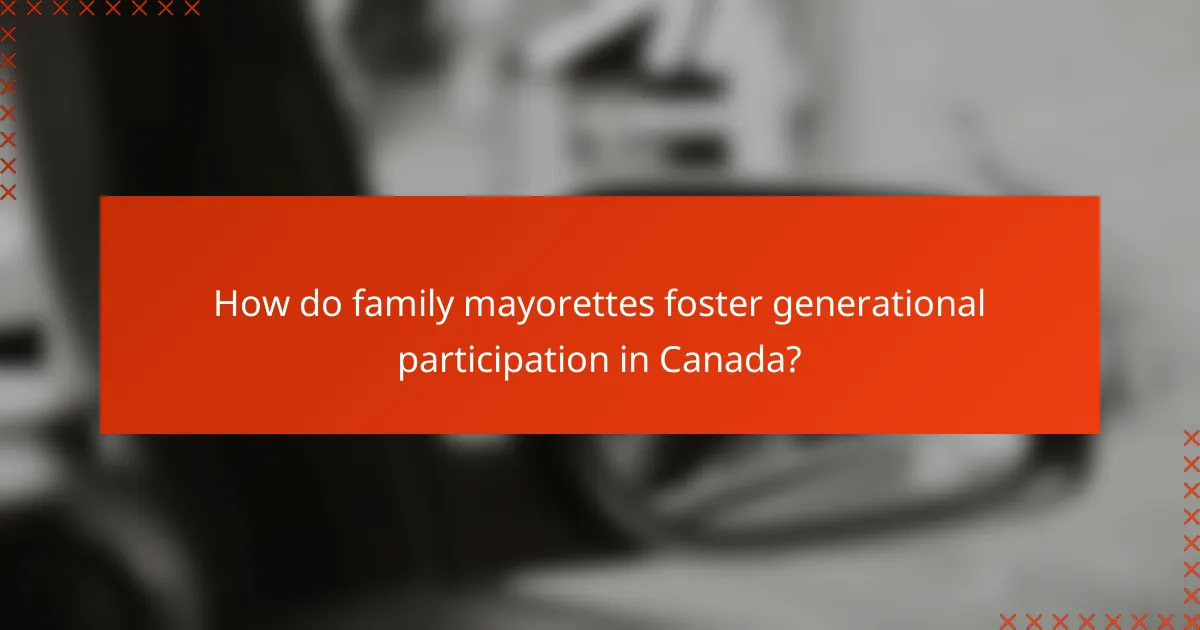
How do family mayorettes foster generational participation in Canada?
Family mayorettes in Canada encourage generational participation by creating a shared platform for bonding and involvement in community activities. Through traditions and events, families engage multiple generations, fostering a sense of belonging and continuity.
Encouragement through family traditions
Family traditions play a crucial role in fostering participation among generations in mayorettes. These traditions often include annual gatherings, rehearsals, and performances that encourage family members to bond over shared experiences. For instance, families may have specific roles or routines passed down, making participation feel meaningful and personal.
By integrating these traditions into their activities, families can instill values of teamwork and commitment in younger members, ensuring that the spirit of mayorettes is preserved and celebrated across generations.
Community events promoting involvement
Community events are vital for promoting involvement in family mayorettes. Local parades, festivals, and competitions often invite families to participate together, creating opportunities for bonding and shared experiences. These events not only showcase the talents of mayorettes but also encourage families to support one another, enhancing their collective experience.
Participation in these events can lead to increased visibility for family mayorettes, attracting new members and reinforcing community ties. Families often find joy in collaborating with others, which strengthens their commitment to the mayorette tradition.
Mentorship programs for youth
Mentorship programs are essential for nurturing youth involvement in family mayorettes. These programs typically pair experienced mayorettes with younger participants, providing guidance and support as they learn the ropes. This one-on-one interaction helps instill confidence and skills in the younger generation, ensuring they feel valued and capable.
Additionally, mentorship fosters a sense of responsibility among older members, as they pass down knowledge and traditions. This reciprocal relationship not only strengthens family bonds but also ensures the longevity of mayorette participation within the community.
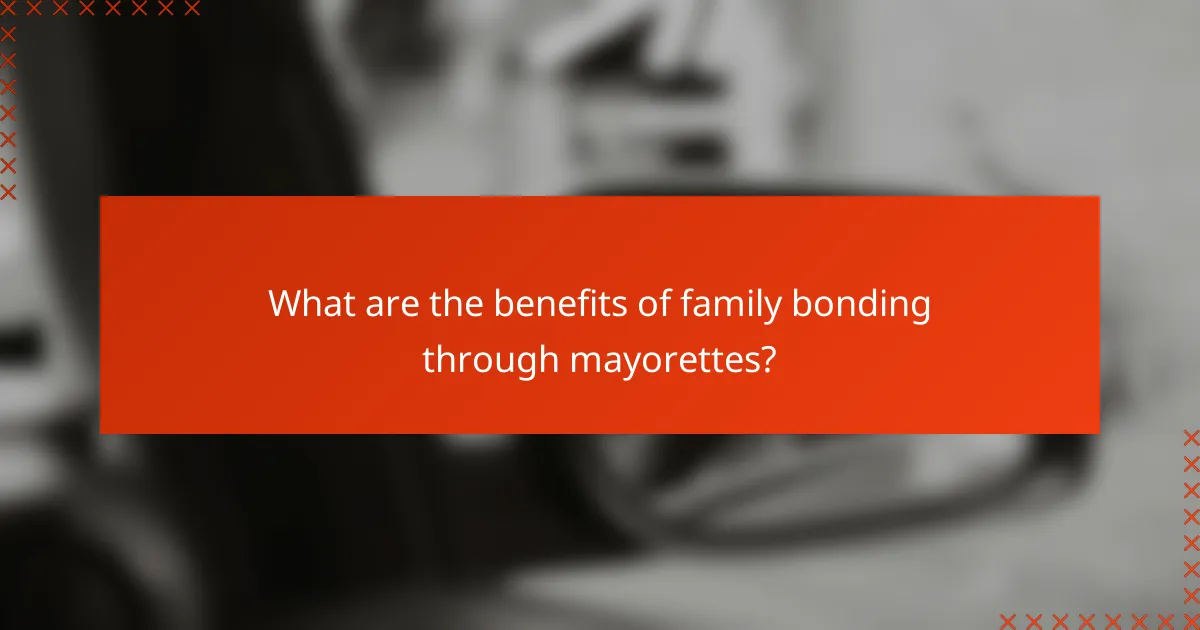
What are the benefits of family bonding through mayorettes?
Family bonding through mayorettes offers numerous advantages, including enhanced relationships, shared experiences, and the development of teamwork skills. Engaging in this activity together fosters a sense of unity and belonging among family members.
Strengthened family relationships
Participating in mayorettes can significantly strengthen family relationships by creating opportunities for communication and collaboration. Families that practice together often find themselves sharing challenges and triumphs, which can deepen their emotional connections.
Regular involvement in mayorettes allows family members to support one another, fostering a sense of trust and reliance. This shared commitment can lead to improved understanding and appreciation of each other’s strengths and weaknesses.
Shared experiences and memories
Mayorettes provide a platform for families to create lasting memories through shared experiences. Whether it’s preparing for performances or celebrating achievements, these moments become cherished stories that families can reminisce about for years to come.
Engaging in this activity together can also help families develop traditions and rituals, further solidifying their bond. These shared experiences can range from participating in local competitions to attending regional events, each contributing to a rich tapestry of family history.
Development of teamwork skills
Involvement in mayorettes naturally cultivates teamwork skills among family members. As they work together to perfect routines and support each other during performances, they learn the importance of collaboration and communication.
Families can benefit from setting specific roles and responsibilities within their mayorettes practice, which encourages accountability and cooperation. This experience not only enhances their performance but also translates into improved teamwork in other areas of life, such as school or work environments.
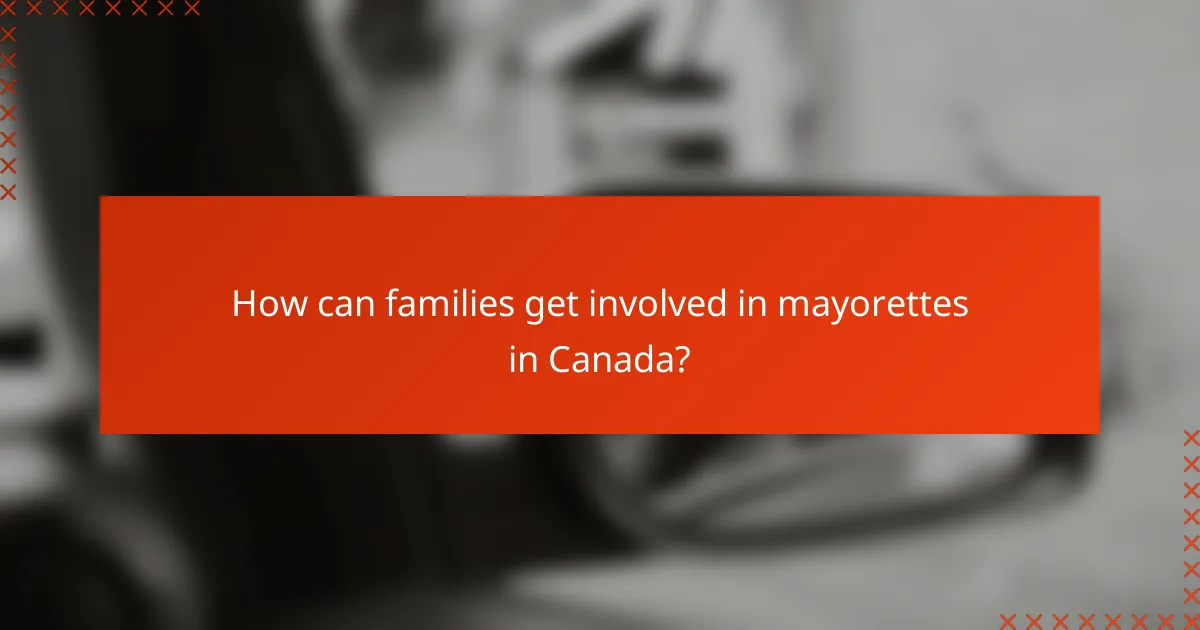
How can families get involved in mayorettes in Canada?
Families in Canada can engage in mayorettes by joining local groups, participating in training sessions, and attending community events. These activities foster family bonding and create shared experiences that enhance the mayorette tradition.
Joining local mayorette groups
To get started, families should seek out local mayorette groups in their community. Many cities have established organizations that welcome new members of all ages, providing a supportive environment for families to participate together.
When joining, consider the group’s schedule, membership fees, and the age range of participants. Some groups may require a commitment to practice sessions and events, so it’s essential to assess your family’s availability and interest level.
Participating in workshops and training
Workshops and training sessions are vital for families looking to improve their mayorette skills. These sessions often cover various aspects of mayorettes, including choreography, teamwork, and performance techniques.
Families can find workshops offered by local groups or community centers, typically at low or no cost. Engaging in these training opportunities not only enhances skills but also strengthens family bonds through shared learning experiences.
Attending community parades and events
Community parades and events are excellent opportunities for families to showcase their mayorette skills and connect with others. Participating in these events allows families to experience the excitement of performing in front of an audience while celebrating local culture.
Check local event calendars for upcoming parades and festivals where mayorettes will perform. Families should prepare by practicing routines together and coordinating outfits, which can add to the fun and foster a sense of unity.

What are the key criteria for selecting a mayorette program?
Key criteria for selecting a mayorette program include the organization’s reputation, the availability of training resources, and the inclusivity of its policies. Evaluating these factors can help ensure a positive experience for participants and their families.
Reputation of the organization
The reputation of the mayorette organization is crucial as it reflects the quality of the program and its commitment to participants. Look for programs with a history of successful events and positive feedback from past participants and their families.
Research online reviews, testimonials, and social media presence to gauge the organization’s standing in the community. Engaging with current or former mayorettes can provide valuable insights into their experiences.
Availability of training resources
Access to training resources is essential for developing the skills needed to participate effectively in a mayorette program. Check if the organization offers comprehensive training sessions, workshops, and materials that cover various aspects of performance and teamwork.
Consider programs that provide ongoing support and mentorship, as this can enhance the learning experience. Availability of training resources can vary, so inquire about schedules and formats, such as in-person or online options.
Inclusivity and family-friendly policies
Inclusivity and family-friendly policies are important for fostering a welcoming environment for all participants. Look for programs that actively promote diversity and encourage participation from families of different backgrounds.
Assess whether the organization has policies in place to support family involvement, such as flexible scheduling for practices and events. Programs that prioritize inclusivity often create stronger bonds among participants, enhancing the overall experience.
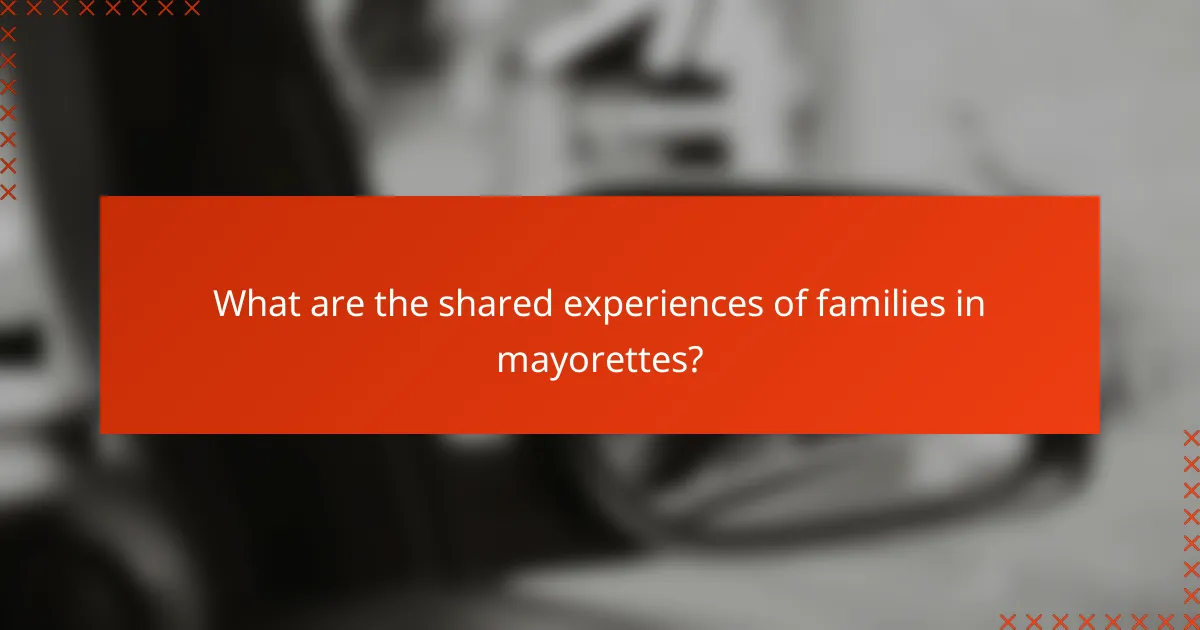
What are the shared experiences of families in mayorettes?
Families involved in mayorettes share a variety of experiences that strengthen their bonds and create lasting memories. These shared activities often include participating in competitions, attending regional gatherings, and establishing family traditions around events.
Participating in competitions
Competing in mayorette events allows families to work together towards a common goal, fostering teamwork and camaraderie. Families often train together, practicing routines and perfecting their performances, which can enhance their relationships.
Competitions typically take place at local, regional, and sometimes national levels, providing opportunities for families to showcase their skills. The excitement of preparing for these events can create a sense of unity and shared purpose among family members.
Attending regional gatherings
Regional gatherings offer families a chance to connect with other mayorettes and their families, expanding their social circle. These events often include workshops, performances, and social activities that encourage interaction and collaboration.
Such gatherings can also serve as a platform for families to share their experiences, tips, and strategies, enriching their understanding of the mayorette culture. The collective enthusiasm at these events can strengthen family ties and create a sense of belonging within the community.
Creating family traditions around events
Establishing family traditions related to mayorette events can enhance the overall experience and create lasting memories. Families might develop rituals, such as pre-competition meals or post-event celebrations, that become special moments to look forward to each year.
These traditions not only strengthen family bonds but also provide a sense of continuity and identity within the mayorette community. Over time, these shared experiences can be passed down through generations, enriching family history and connection.
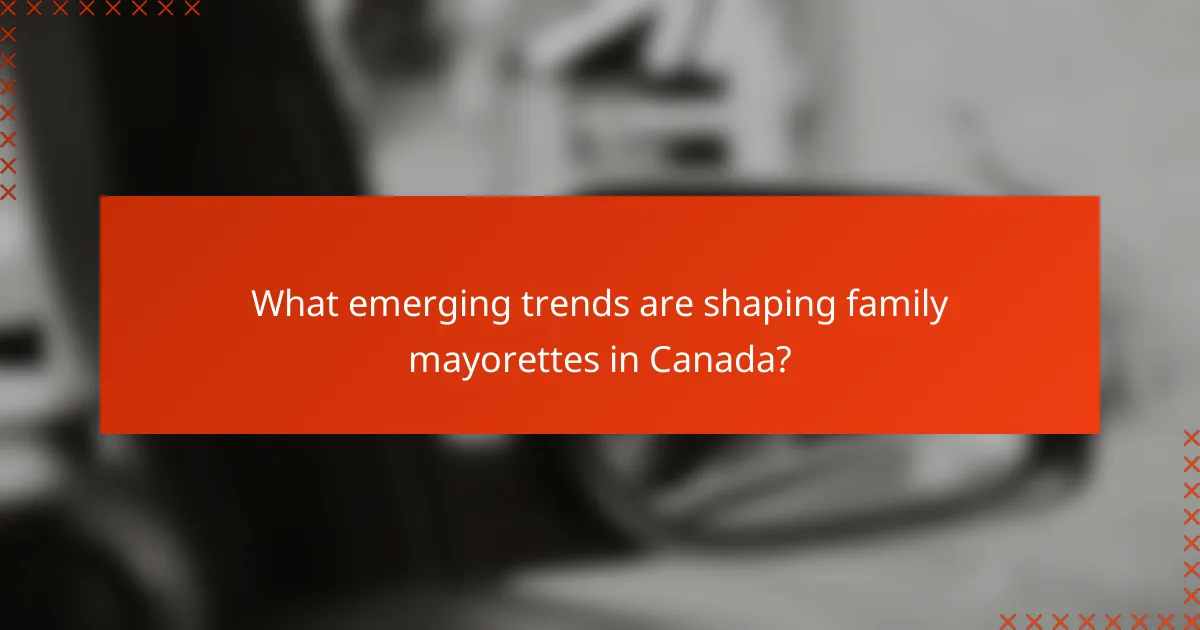
What emerging trends are shaping family mayorettes in Canada?
Family mayorettes in Canada are increasingly influenced by a focus on generational participation and shared experiences. These trends foster stronger family bonds and encourage multi-generational involvement in community events.
Generational Participation
Generational participation in family mayorettes involves family members of different ages engaging together in activities. This trend allows younger members to learn from their elders while contributing fresh perspectives. Families often participate in local parades and festivals, creating a sense of continuity and tradition.
To encourage generational involvement, families can establish roles for each member, ensuring everyone contributes based on their strengths. For example, older members might handle logistics while younger ones focus on performance or decoration. This approach not only strengthens family ties but also enhances the overall experience.
Family Bonding
Family bonding through mayorettes activities is vital for creating lasting memories and shared goals. Participating together in events fosters teamwork and communication, essential elements for strong family relationships. Families often report feeling closer after working together on projects or participating in performances.
To maximize bonding, families can set aside regular practice times or planning sessions. Engaging in fun, collaborative tasks, such as costume design or choreography, can enhance the experience. This shared effort helps families to connect on a deeper level and enjoy the process together.
Shared Experiences
Shared experiences in family mayorettes create a unique narrative that families can cherish. These experiences often include rehearsals, performances, and community engagements that become cherished stories passed down through generations. Families find joy in reliving these moments, strengthening their identity and sense of belonging.
To cultivate shared experiences, families can document their journey through photos or journals. Reflecting on past events during family gatherings can also reinforce these bonds. By celebrating achievements and milestones together, families can create a rich tapestry of memories that enhances their connection to one another and their community.
